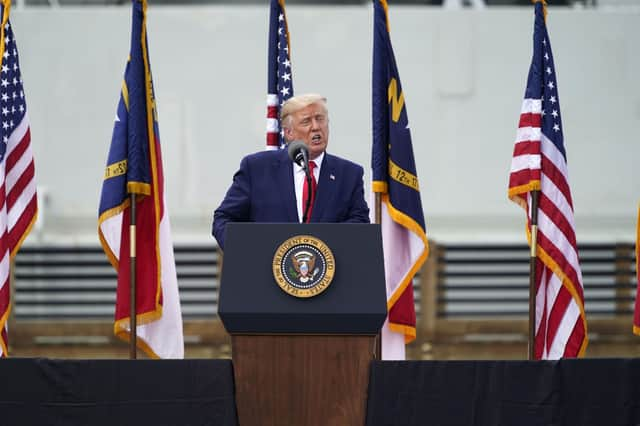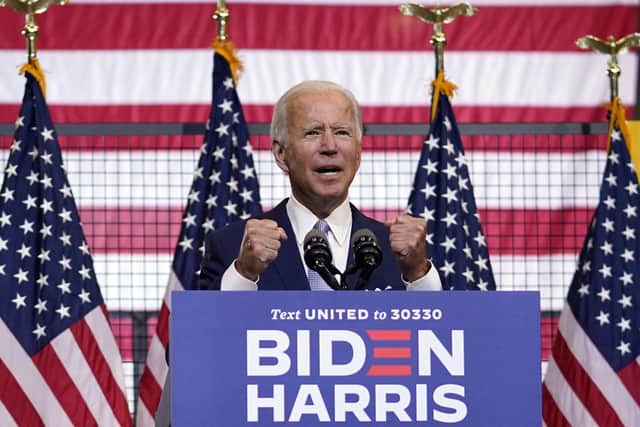Religion is a key dimension of this US presidential election


The president claimed that his opponent would “double and triple” peoples’ taxes in following “the radical left agenda”.
Characterising Mr Biden’s approach, Mr Trump continued: “Take away your guns. Destroy your Second Amendment. No religion. No anything. Hurt the Bible. Hurt God. He’s against God. He’s against guns.”
Advertisement
Hide AdAdvertisement
Hide AdIt was a remarkable outburst from the man who holds the position recognised as that of leader of the free world. One would expect greater judiciousness from someone holding that office.


But Donald Trump just says what he feels, not least about religion.
Asked in 2016 by the American journalist, Cal Thomas, who he says Jesus is, he replied: “Jesus to me is somebody I can think about for security and confidence. Somebody I can revere in terms of bravery and in terms of courage and, because I consider the Christian religion so important, somebody I can totally rely on in my own mind.”
He also said: “I will be asking for forgiveness, but hopefully I won’t have to be asking for much forgiveness.”
Advertisement
Hide AdAdvertisement
Hide AdThe comments came the year after Mr Trump had told a Family Leadership Summit, responding to a question as to whether he had ever asked God for forgiveness: “I’m not sure I have. … If I do something wrong I just try and make it right. I don’t bring God into that picture.”
However, he went on to say he felt that when, as a Presbyterian, he receives communion, it is “a form of asking for forgiveness”.
However, leaving aside these reflections, bringing God into his denunciation of Mr Biden was nothing less than a blatant attempt to politicise the name of the Almighty and his linking of the name of God with guns was surely crass.
Of course, religious people are not necessarily pacifists. Indeed, there are chaplains to the forces. Yet Mr Trump’s reference to guns was about them being relatively freely available to citizens.
Advertisement
Hide AdAdvertisement
Hide AdThe Second Amendment of the US constitution states: “A well regulated Militia, being necessary to the security of a free State, the right of the people to keep and bear Arms, shall not be infringed.”
The wording here is somewhat obscure and, in fact, is considerably debated.
The Legal Information Institute of Cornell Law School at Ithaca, New York, points out that while some believe that the Amendment’s phrase “the right of the people to keep and bear Arms” creates an individual constitutional right for citizens of the United States, some scholars point to the wording, “a well regulated Militia”, to argue that the framers of the text intended only to restrict Congress from denying a state’s right to self-defence.
But what about God?
Elizabeth Dias, religion correspondent for the New York Times, has commented that the relationship between white evangelical Christians and Donald Trump can seem “mystifying” to the outside observer.
Advertisement
Hide AdAdvertisement
Hide AdA chief reason that Dias mentions as explaining the connection is the “transactional” one, which views white evangelical Christians as seeing Mr Trump as an ally in their fight against legalized abortion and as providing the best way to secure conservative judges to the US Supreme Court.
Indeed, US presidents have the right of appointment to the Supreme Court and Mr Trump has appointed two members – Neil Gorsuch and Brett Kavanaugh – leaving five of the nine as Republican presidential appointees.
The Washington DC-based Pew Research Centre, which describes itself as “a nonpartisan fact tank”, has published the results of a June survey which indicated overall adult support for Trump and Biden as standing at 44% and 54% respectively, but with support among Christians split very differently, at 58% to 40% respectively.
More specifically, among white evangelicals Trump support rocketed to 82%, but by contrast Black Protestants supported Biden by 88%.
Advertisement
Hide AdAdvertisement
Hide AdIt is clear that religion is an important if not straightforward dimension of the election equation but, paradoxically, as Religion News Service (RNS) reported, on the very day that Mr Trump described Mr Biden as being “against God”, the latter addressed a virtual meeting of the Progressive National Baptist Convention, which is predominantly Black.
Referring to the killing of George Floyd, RNS reported Mr Biden as saying: “The Psalm tells us that ‘weeping may endure for the night, but joy cometh in the morning’. There’s no question about that. The night feels endless right now — exhausting, heartbreaking, impossible to endure. When the words, ‘I can’t breathe’, echo in our national conscience.... The night is long, but joy cometh in the morning, and it’s up to us to make sure it does.”
The Democratic contender also referred to the Lord’s words to St Paul at 2nd Corinthians 12, verse 9: “My grace is sufficient for you, for my power is made perfect in weakness.”
Words are of course all very well but what really counts is putting words into actions and, for religious people, allowing faith to be a real determiner of those actions.
Advertisement
Hide AdAdvertisement
Hide Ad• Canon Ian Ellis is a former editor of The Church of Ireland Gazette
——— ———
A message from the Editor:
Thank you for reading this story on our website. While I have your attention, I also have an important request to make of you.
With the coronavirus lockdown having a major impact on many of our advertisers — and consequently the revenue we receive — we are more reliant than ever on you taking out a digital subscription.
Subscribe to newsletter.co.uk and enjoy unlimited access to the best Northern Ireland and UK news and information online and on our app. With a digital subscription, you can read more than 5 articles, see fewer ads, enjoy faster load times, and get access to exclusive newsletters and content. Visit https://www.newsletter.co.uk/subscriptions now to sign up.
Advertisement
Hide AdAdvertisement
Hide AdOur journalism costs money and we rely on advertising, print and digital revenues to help to support them. By supporting us, we are able to support you in providing trusted, fact-checked content for this website.
Alistair Bushe
Editor